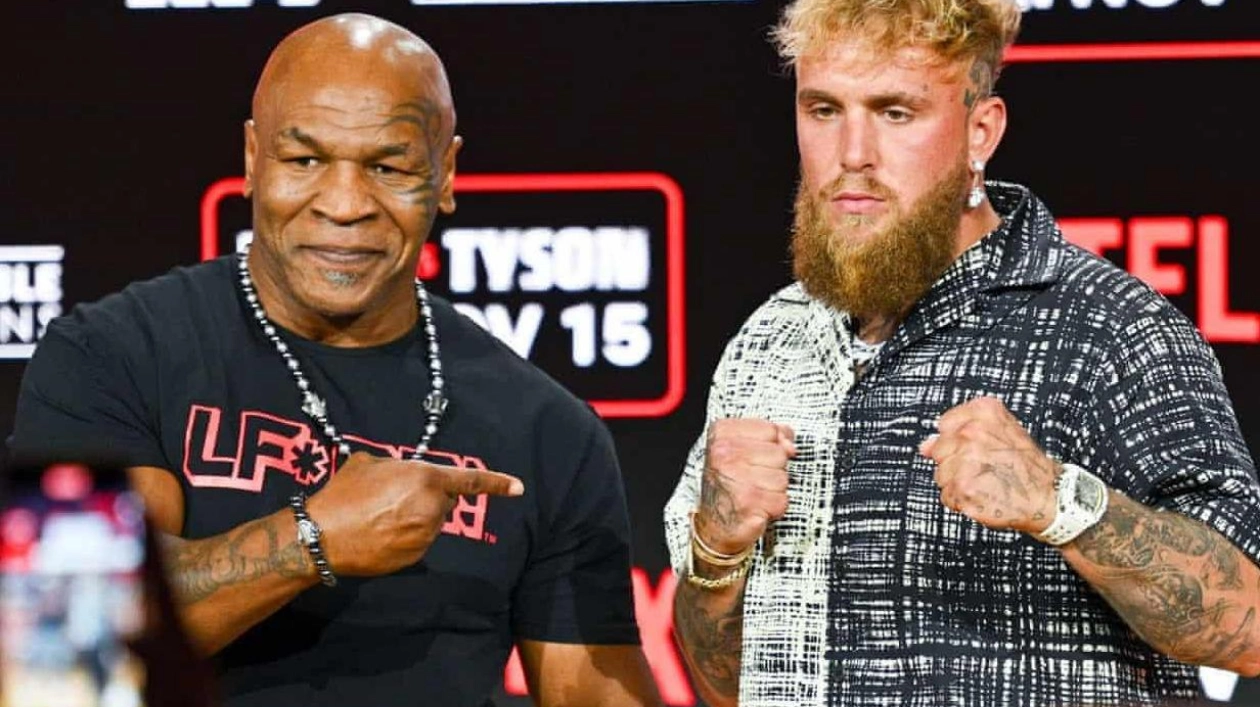Mark Borkowski, the public relations maestro, has worked with a diverse array of clients, from Mikhail Gorbachev to Diego Maradona, and even Jim Rose, an American exhibitionist known for his extreme performances. Borkowski also orchestrated Ian Botham's recreation of Hannibal's trek across the Alps with elephants and, famously, helped Cliff Richard's 'Saviour's Day' reach Christmas No 1 despite minimal radio airplay. Given his extensive experience, Borkowski is uniquely positioned to comment on the year's most significant sporting event: Mike Tyson's upcoming fight against Jake Paul, which will be streamed to 300 million homes via Netflix this weekend.
Initially, I expressed my disdain for the idea to Borkowski, as do most boxing enthusiasts. The event perpetuates a myth that was never true, even in 2004, let alone 2024: the notion that Tyson is one of the fiercest warriors alive, rather than a 58-year-old who shed 26 pounds in May due to an ulcer flare-up that caused him to vomit blood and pass tar-like stools. This fight jeopardizes Tyson's boxing legacy and his health. Despite Netflix's grand promotion, it feels more like a circus act than a genuine sporting contest.
However, I might be mistaken. Borkowski certainly thinks so. He views the fight as a modern-day PT Barnum spectacle, a master of the absurd and extraordinary who intuitively knew what the public desired before they did. Borkowski believes it will captivate the masses. 'Barnum understood how to engage the crowd – the great herd, the great unwashed,' he explains. 'This fight is about opportunism and creative thinking. It's already generating the oxygen of publicity, a sure sign of success.'
Borkowski points out that the fight appeals to two major demographics: Boomers and Gen Xers who grew up watching Tyson, and younger generations who idolize Jake Paul. 'Many boys project themselves into male influencers like Paul,' he notes. 'In some ways, they are their best mates – whether it's watching them play Call of Duty or seeing the Jackass-influenced generation of pranksters on social media. So they will be watching this. And so will those who grew up with Tyson in his prime. While purists might sneer, there's a market for this. And Netflix knows it.'
But is it truly a sport? Borkowski doesn't deny the entertainment aspect. However, he believes it doesn't matter as long as the fight delivers in some way. 'The root of this fight is absolutely that of World Wrestling Entertainment,' he says. 'It's a fusion of sport and entertainment. You feel that part of it is staged. Will anybody get seriously hurt? I doubt it, given they are wearing 14-ounce gloves. So it is more WWE than WBA.'
Borkowski's ultimate endorsement is, 'I'd be only too pleased to come up with something like this.' He isn't alone in thinking Netflix is onto a winner. Adam Kelly, president of media at global sports rights agency IMG, shares similar sentiments. Having worked closely with the Ultimate Fighting Championship and Al Haymon to promote Floyd Mayweather versus Conor McGregor in 2017, Kelly sees Tyson versus Paul as having comparable crossover appeal.
Kelly's perspective is that in a world where TV ratings are declining, sport is bucking the trend with record ratings for the NFL, Olympics, Euros, and Women's NBA. Consequently, media and tech giants like Netflix and Amazon are increasingly focusing on live sports to drive subscriptions and sell products. Given their business acumen, would you bet against them? 'This fight is much bigger than boxing,' Kelly asserts. 'This is the road, and the road map, that's going to prove the model for Netflix when it comes to sport.'
Kelly predicts that Tyson vs Paul 'will be one of the biggest fights ever broadcast.' This is due to Netflix's massive subscriber base, its algorithm's ability to push new content, and the intrigue surrounding the fight. He has a message for purists who dismissed Mayweather against McGregor and continue to disdain influencers like Paul. 'These fights have encouraged new fans and sparked fresh interest in boxing,' he insists. 'If boxing only appeals to a hardcore fan base, with technical fights, eventually it will die. Because its audiences will age, and then they'll die.'
This warning applies to all sports. 'You have to be constantly looking to build your audience,' says Kelly. 'And that means making a product that specifically appeals to people who are not your current fans. Unless you're doing that, you're on a shrinking iceberg.'
I don't disagree. Yet, I still cringe when I hear Netflix promoting the fight in Arlington, Texas, as the 'biggest name in social media against the biggest name in boxing,' or when I see Muhammad Ali's former manager Gene Kilroy tell Tyson recently: 'This is the strongest I have ever seen you.' This isn't just brazen hype; it's deluded nonsense.
It brings to mind the oft-misattributed Barnum adage: 'There's a sucker born every minute.' Barnum is also claimed to have said: 'Every crowd has a silver lining.' In the context of this uneasy spectacle, that seems somewhat fitting.
Source link: https://www.theguardian.com






